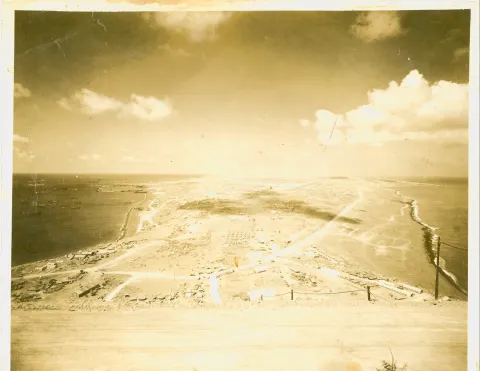Remembering Pearl Harbor

The other day I was reminded that perhaps I’d better write my memories of Pearl Harbor while I still can. My daddy, Dempsey Heiskell, had bought a Philco battery radio so we could hear the War news. Our house had by now been wired for electricity, and there was great excitement in anticipating the lights coming on with the flip of a switch instead of a match. This had not happened yet, so the battery that looked like a ten-pound mold of butter enabled my family to keep up with what was happening in Europe. Neighbors who did not yet have radios stopped by frequently to hear the latest news. The past few years had been consumed with news of what the coming of the Tennessee Valley Authority, the Civilian Conservation Corps, and the Works Progress Administration meant to the area.
Suddenly the focus also included Japan. As I recall, it was the noon news or a special broadcast around mid-day that very dramatically announced that Japan had bombed Pearl Harbor. I was six years old; and, frankly, Pearl Harbor seemed much closer to home that it really is. I can attest to the fact that children worry. President Roosevelt’s announcement that the United States was “at war” was disturbing. I can still remember the high drama in Roosevelt’s voice as he addressed the Nation on December 7, 1941. It was very distressing that people were killing each other and that young men I knew would have to go fight for our country. I knew my brothers would have to go. It seemed like when these young men left their families we didn’t expect to see them again. Some, of course, did not return. The days, months, and several years ahead were stressful, patriotic, sacrificing, and not the happy childhood days we envision for our children. One by one my brothers and an uncle who lived with us were called into service. My brother, Jim, served under General Patton. Verlin joined the Merchant Marines and sailed around South Africa. J. P. served in the U. S. Navy and was a machinist on an LST sailing between the East Coast and Europe, France and Italy, in particular. Ben was drafted a few months before his senior year in high school ended and after training was sent with the Navy CBs to Iwo Jima. He survived a bloody battle there and brought home pictures to prove it. My uncle, Clyde Seymour, was drafted into the Army and served at Battle Creek, Michigan. Thankfully, they all got back home safely when the war ended.
Everything became so scarce that, in fact, the government rationed many products; and grocery stores were required to collect ration stamps that had been issued to each family each time they sold a rationed item. Nylon stockings were a scarce item. Gas was rationed; but, since we didn’t have a car, it didn’t matter much to our family. Also, it was my mother’s practice to preserve by canning or drying every food available. It was not a matter of how much the family needed a particular year. If it was available, she saved it; because no one knew what would be available the following year. Therefore, rationing didn’t matter so much except for coffee and sugar.
.
A few days after I began school in August of 1941, my dad became very ill. He was sent by Dr. R. S. Monroe to the hospital and had to spend 17 days at the old Knoxville General Hospital having had surgery by his cousin, Dr. Hurtle T. McClain, for a ruptured appendix that had “set up” gangrene. Unfortunately, 68 years later, appendicitis is still not easily diagnosed. After he got home, Dr. Norman Rucker, of Luttrell, made house calls to check on him. All this is to say that he was just getting back on his feet when this terrible incident shook our Nation.
As I mentioned earlier, our house was wired for electricity by Carl Graves before he was called to the service. The electric power was turned on January 20, 1942, so we no longer had to read by a kerosene lamp. It was–and still is–wonderful. The day the power was turned on my daddy went to Knoxville and bought for my mother a new Easy electric wringer washer and a GE electric iron.
Wash day was no longer such a back-breaking hard job. Wash day was difficult enough in summer, but standing in front of a tub on the back porch and scrubbing on overalls during the middle of the winter was doubly awful. We still had to heat water for the washer. It was many years later before we had water in the house and an electric water heater. The clothes were then hung on an outdoor line to dry–white together, then colored clothes and personal items at the back where they would not be viewed from the road. Country people may not have had lots of money, but they had lots of class. We did not get a refrigerator until 1945 when the war ended, but that General Electric refrigerator was still running when my mother died in 1994. Can you imagine anything manufactured today running more than fifty years?
I have visited the Memorial at Pearl Harbor twice. Each time it made cold chills run down my spine to think of the horror and loss it represents. Standing there on the “gangplank” at Pearl Harbor will imprint on your heart–Freedom is not Free!
- Log in to post comments